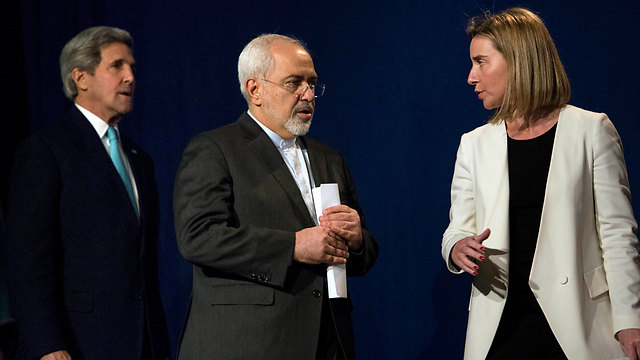Iran’s FM denies Islamic Republic ‘jails people for their opinions’, incurs social media wrath
By JPOST.COM STAFF/05/02/2015
Iran’s Foreign Minister is facing a flurry criticism after suggesting in a recent television interview that the Islamic Republic does not persecute individuals based on their opinions. Mohammad Javad Zarif, whose representation of Tehran during the contrversial P5+1 nuclear negotiations in Switzerland brought him into the public eye, sat down with Charlie Rose on Friday for a sixty-eight minute interview at whose end he was asked about the ongoing detention of Jason Rezaian, an American-Iranian journalist that has languished in the Iranian prison system for the past nine-months.
“Iran does not jail people for their opinions,” Zarif answered, despite the fact that Iran maintains one of the worst records for press freedom in the world, ranking 173 according to the 2014 Press Freedom Index, coming in just after Sudan.Mister Zarif outlined what he says is his government’s plan “to improve, enhance human rights in the country.”But people who commit crimes, who violate the laws of a country cannot hide behind being a journalist or being a political activist, people have to observe the law,” he added.
Speaking to the Guardian a day after Zarif’s interview aired, Nasrin Sotoudeh, Iran’s most outspoken human-rights activist and lawyer rejected the foreign minister’s claims, asserting that “there are plenty of prisoners of conscience behind bars in Iran held solely because of their opinions.”
Of the thirty journalists currently and imprisoned in Iran as of 2014, twenty-six are serving time on charges of crimes of an “anti-state” nature, while others have been jailed for “false news” or “insult.”
Yet Sotoudeh did not simply refer to journalists, but included lawyers, students as well as religious minorities such as Baha’is and Christians in her assessment. Indeed according to a UN report on Iran from March 2014, “under the law, religious minorities, including recognized Jews, Christians, and Zoroastrians also face discrimination in the judicial system, such as harsher punishments.”The report included figures indicating that“as of 3 January 2014, at least 307 members of religious minorities were in detention, of whom 136 were Baha’is, 90 Sunni Muslims, 50 Christians, 19 Dervish Muslims , four were Yarasan, two were Zoroastrians, and six were from other groups.”
A recent statement from March from a UN official expressed a similar sentiment, dispelling any preconception that Iran’s new administration, considered by some to be more moderate than the previous one lead by Mahmoud Ahmadinejad, has tempered its approach to ordinary Iranian’s freedom of expression. According to Ahmed Shaheed, the UN’s rapporteur of human rights, enforcers of Rouhani’s government “continue to harass, arrest, prosecute and imprison many members of society who express criticism of the government or publicly deviate from officially sanctioned narratives.”Zarif did not escape the wrath of social media either, where his opponents expressed their malcontent more robustly.One user took to Zarif’s Facebook page, commenting, “nobody is jailed in Iran for his or her opinion? Liar.”Another compared Zarif to Iran’s notoriously bombastic former president, saying “When you lie, there is no difference between you and Mahmoud Ahmadinejad.”There were religiously flavored critiques as well, with one accusing Zarif of spiritual purgory – “One who lies is the enemy of God.”

















